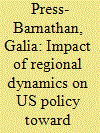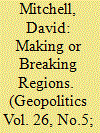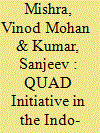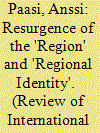|
|
|
Sort Order |
|
|
|
Items / Page
|
|
|
|
|
|
|
| Srl | Item |
| 1 |
ID:
138099


|
|
|
|
|
| Summary/Abstract |
This paper examines American policy regarding regional security arrangements (RSAs) in Asia. It argues that it is American perceptions of regional interest in such RSAs and of the compatibility of the goals of regional partners with those of the United States, which eventually shape American policy. After discussing the potential value and cost of RSAs, it suggests that actual policy choices are shaped largely as a reaction to regional states’ motivations and policies. Since in Asia, there was limited functional pooling effect to be gained from RSAs, changes in American policies reflected much more a reaction to changes in regional interest in such arrangements. This interaction is demonstrated through a review of post-Cold War developments regarding US RSA policy, distinguishing between the early years of transition to unipolarity and the erosion of unipolarity since the late 1990s. These are also compared to earlier American policy regarding RSAs during the Cold War.
|
|
|
|
|
|
|
|
|
|
|
|
|
|
|
|
| 2 |
ID:
150796


|
|
|
|
|
| Publication |
DelhI, Kalpaz Publications, 2012.
|
| Description |
304p.hbk
|
| Standard Number |
9788178359236
|
|
|
|
|
|
|
|
|
|
|
|
Copies: C:1/I:0,R:0,Q:0
Circulation
| Accession# | Call# | Current Location | Status | Policy | Location |
| 058937 | 382.0954/JAI 058937 | Main | On Shelf | General | |
|
|
|
|
| 3 |
ID:
140268


|
|
|
|
|
| Summary/Abstract |
The idea of non-alignment has remained a central component of Indian identity in global politics that is manifest in continuities: since independence in 1947 India has been in pursuit of strategic autonomy, a quest that in practice has led to semi-alliances fashioned under the cover of non-alignment and shaped by regional dynamics. In this setting, the rise of China now raises an interesting conundrum for Indian policy-makers as New Delhi seeks to balance the benefits and risks of an increasingly assertive neighbour and a network of alliances with like-minded countries. This article approaches this enigma by delineating continuities of non-alignment from the early roots of the policy, through the Cold War-era and into the modern-day international system. Though domestic factors have had a significant influence on the trajectory of Indian foreign policy, the continuities of non-alignment have prevailed through changes in leadership and domestic vicissitudes. By exploring the foundation of non-alignment and how India has operationalized the policy, this article maintains that to some extent continuity will persist: India will likely continue its rhetoric in favour of strategic autonomy while moving closer to the West and its allies in practice. Yet in order to effectively balance China's growing influence, India will need to be more assertive in building these alliances, as the success of its modern-day pursuit of strategic autonomy may well rest on a strong foundation of strategic partnerships. The coming to office in May 2014 of the National Democratic Alliance government led by Narendra Modi has signalled a move away from even the rhetoric of non-alignment, with significant implications for the future of Indian foreign policy.
|
|
|
|
|
|
|
|
|
|
|
|
|
|
|
|
| 4 |
ID:
181319


|
|
|
|
|
| Summary/Abstract |
China’s Belt and Road Initiative (BRI) has gained worldwide attention, as the government of Xi Jinping has committed itself to globe the spanning connectivity project. Global in scope, the role of regions and regional organisations has been identified as being important elements in bringing the BRI to fruition, even though its execution has been based on bilateral agreements. This is true in those regions, notably South Asia, Southeast Asia and the Indian Ocean that are central to the BRI’s immediate development and early recipients of substantial investment. This raises the question of what type of influence the BRI will have on these regional groupings. Drawing on the concept of ‘regionness’ developed by Hettne and Söderbaum, this study assesses how the aforementioned regions are affected by their respective states’ participation in the BRI. Each case will assess changes in institutions, transnational linkages and development of shared identity of each region. Regional change in these areas is highly contingent, it is found that an alternation of the ‘regionnness’ is most likely in the case of South Asia and the Indian Ocean.
|
|
|
|
|
|
|
|
|
|
|
|
|
|
|
|
| 5 |
ID:
193448


|
|
|
|
|
| Summary/Abstract |
This research paper delves into the Quad (Quadrilateral Security Dialogue) alliance’s role and significance in shaping the geopolitical landscape of the Indo-Pacific region. Through a comprehensive analysis of the strategic imperatives driving the QUAD countries - the United States, Japan, India, and Australia - this study examines the alliance’s evolving objectives, regional partnerships, and the impact on maritime security, economic cooperation, and diplomatic alignments.
|
|
|
|
|
|
|
|
|
|
|
|
|
|
|
|
| 6 |
ID:
087934


|
|
|
|
|
| Publication |
2009.
|
| Summary/Abstract |
'New regionalism', 'region', 'city-region', 'cross-border region', 'border' and 'identity' have become important catchphrases on the global geo-economic and geopolitical scene. The resurgence of these terms has been part of the transformation of both political economy and governance at supra-state, state and sub-state scales. Regions have been particularly significant in the EU where both the making of the Union itself and the 'Europe of regions' are concrete manifestations of the re-scaling of state spaces and the assignment of new meanings to territory. Such re-scaling has also led to increased competition between regions; a tendency that results from both the neo-liberalisation of the global economy and from a regionalist response. Regional identity, an idea at least implicitly indicating some cohesiveness or social integration in a region, has become a major buzzword. It has been particularly identified in the EU's cohesion policy as an important element for regional development. In spite of their increasing importance in social life and academic debates, regions, borders and identities are often studied separately, but this paper aims at theorising and illustrating their meanings in an integrated conceptual framework and uses the sub-state regions in Europe, and particularly in Finland, as concrete examples. Regions are conceptualised here as processes that gain their boundaries, symbolisms and institutions in the process of institutionalisation. Through this process a region becomes established, gains its status in the broader regional structure and may become a significant unit for regional identification or for a purported regional identity. This process is based on a division of labour, which accentuates the power of regional elites in the institutionalisation processes.
|
|
|
|
|
|
|
|
|
|
|
|
|
|
|
|
|
|
|
|
|